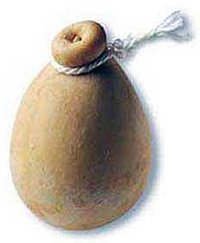Difference between revisions of "Caciocavallo"
m |
m |
||
| Line 1: | Line 1: | ||
| − | [[Image:Caciocavallo.jpg|thumb| | + | [[Image:Caciocavallo.jpg|thumb|200px|right]] |
'''Caciocavallo''' ([[Albanian language|Albanian]]: ''Kaçkavall''; [[Bulgarian language|Bulgarian]] and [[Macedonian language|Macedonian]] ''Кашкавал'' (''[[Kashkaval]]''); [[Romanian language|Romanian]]: ''Caşcaval''; [[Serbian language|Serbian]]: ''Качкаваљ''; [[Sicilian language|Sicilian]]: ''Cascavaddu''; [[Turkish language|Turkish]]: ''Kaşar'') is a type of [[cheese]] made out of [[sheep]]'s or [[cow]]'s milk, originally produced in [[Sicily]], [[Italy]], but now spread all across the [[Balkans]]. | '''Caciocavallo''' ([[Albanian language|Albanian]]: ''Kaçkavall''; [[Bulgarian language|Bulgarian]] and [[Macedonian language|Macedonian]] ''Кашкавал'' (''[[Kashkaval]]''); [[Romanian language|Romanian]]: ''Caşcaval''; [[Serbian language|Serbian]]: ''Качкаваљ''; [[Sicilian language|Sicilian]]: ''Cascavaddu''; [[Turkish language|Turkish]]: ''Kaşar'') is a type of [[cheese]] made out of [[sheep]]'s or [[cow]]'s milk, originally produced in [[Sicily]], [[Italy]], but now spread all across the [[Balkans]]. | ||
Revision as of 00:32, 4 July 2007
Caciocavallo (Albanian: Kaçkavall; Bulgarian and Macedonian Кашкавал (Kashkaval); Romanian: Caşcaval; Serbian: Качкаваљ; Sicilian: Cascavaddu; Turkish: Kaşar) is a type of cheese made out of sheep's or cow's milk, originally produced in Sicily, Italy, but now spread all across the Balkans.
The Italian name of the cheese Caciocavallo means "Cheese on horseback" and it is sometimes thought that it was originally made from mare's milk, although there appears to be no historical evidence for this. More likely, however, the name derives from the fact that the curd is left to dry by placing it 'a cavallo', i.e. straddling, upon a horizontal stick or branch. [See, inter alia, [1].]
This cheese is shaped like a tear-drop and is similar in taste to aged provolone, with a hard edible rind.
